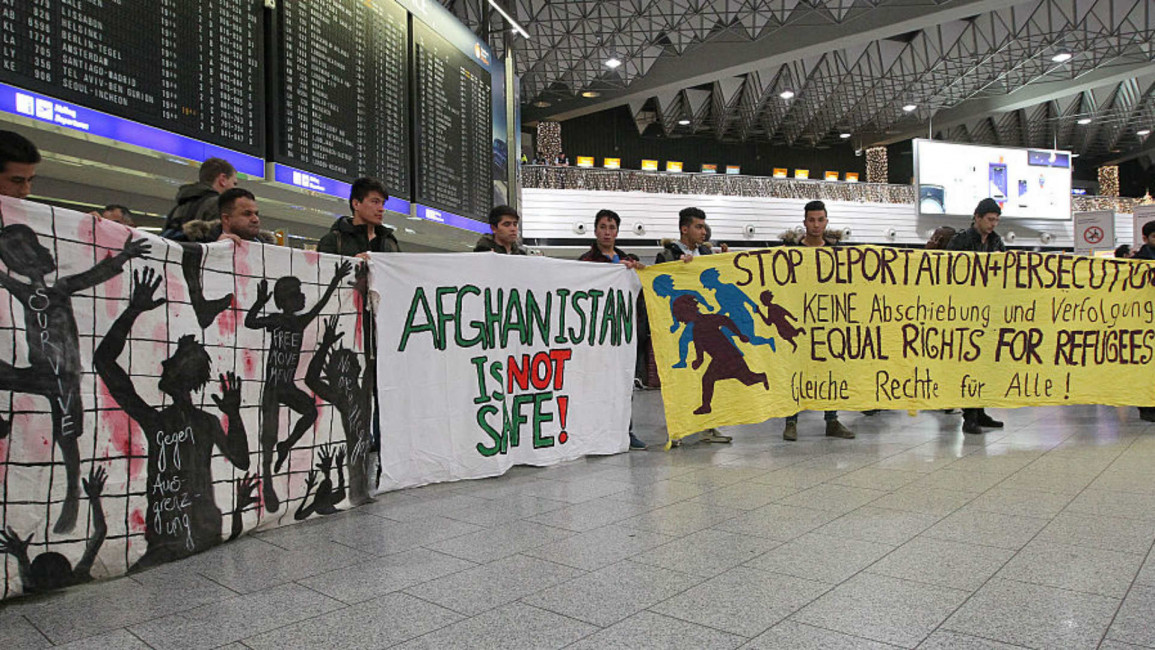The agreement recognises parts of Afghanistan as safe despite mounting evidence to the contrary. In the first six months of 2017, more than 5,243 civilians were wounded or killed across the country because of armed clashes, solidifying Afghanistan's place as one of the deadliest spots in the world.
Europe is well aware of the dangers.
A leaked document from 2016 revealed that EU agencies acknowledged that those sent back to Afghanistan face a high risk of persecution or death from terrorist groups. The document nonetheless stated that more than 80,000 people could be deported to Afghanistan soon.
This policy of refoulement - defined as sending people back to a country where they risk persecution or death – violates international and EU law. Rather than uphold their moral and legal obligations, EU governments are scapegoating asylum seekers to appease growing xenophobia. And right now, Afghans are a primary target.
Blackmail
Afghanistan is already struggling to re-accommodate an unprecedented number of returns from Iran and Pakistan, which started deporting Afghans en masse last year. The former deported at least 130,000 people, while the latter uprooted more than 600,000.
Some of those forced back were born in exile, meaning they don't have a strong support network to help them navigate the social and political terrain in Afghanistan. Others are on the hit list of anti-government militias such as the Taliban or the Islamic State group (IS).
Enter the EU, which claims to be dealing with a migration crisis comparable in magnitude to that facing Afghanistan. Never mind that the figure of Afghans who applied for asylum in 2016 in Europe - more than 180,000 - is nowhere near the half a million who were internally displaced in Afghanistan that same year.
|
 |
The message out of Brussels is clear: Aid comes at the expense of sovereignty |
 |
|
A confidential source in the Afghan government even described the bilateral agreement with the EU as a "poisoned cup". Afghanistan, the source said, was ill-equipped to protect nationals deported from Europe, but had to sign the agreement to secure billions of dollars worth of development aid.
Afghanistan's finance minister, Eklil Hakimi, also told his parliament that if they didn't cooperate with the EU, the bloc would withhold aid.
The leak from Brussels confirmed that the EU threatened to cut aid to Afghanistan if it didn't sign the readmission agreement. With little choice but to agree, Afghan authorities are now more reliant on aid from the EU, than from any other donor.
Read more: More than 200 migrants storm Morocco-Spain border
That's not something to celebrate. The EU has effectively blackmailed Afghanistan, presenting observers with a classic case study of neo-colonialism. The message out of Brussels is clear: Aid comes at the expense of sovereignty.
Internal safe zones
European governments have also designated regions in Afghanistan "safe" in order to justify deportations. These countries recognise that the regions some people fled from are dangerous, but expect them to live elsewhere in the country.
Kabul, for instance, is frequently cited as safe, though member states advise against their own citizens from going there. That's because Kabul isn't safe, experiencing more civilian casualties than any other province in Afghanistan.
Rights groups have expressed concern over this policy, affirming that the practice of deporting people to "internal safe zones" is not consistent with international protocol, and violates the law of non-refoulment.
|
 |
Those already deported because of the agreement should be given a legal route to return |
 |
|
Refusing to remain idle, more people are taking a stand. In Sweden, protests took place across the country in October 2016, denouncing the policy of forced deportations and restrictive asylum laws. One year later, more than 1,000 high school students from Norway demonstrated against the forceful return of an Afghan classmate.
Students in Germany did the same, to the point of brawling with police to protect an Afghan student from deportation. The clashes compelled authorities to release the student, though it remains unclear if he will be allowed to stay in the country.
German pilots also used their privilege to stop 222 deportations between January and September 2017. In most cases, the pilot refused to fly after being notified that an Afghan was on board.
Direct action is clearly working, but more is needed to ensure that authorities fully respect the rights of asylum seekers.
For starters, the law of non-refoulment is not negotiable.
The policy of returning Afghans should be terminated, while those already deported because of the agreement should be given a legal route to return. It's time to give Afghans a way forward instead of a charter flight back to a warzone.
Mat Nashed is a Lebanon-based journalist covering displacement and exile.
Follow him on Twitter: @matnashed
Opinions expressed in this article remain those of the author and do not necessarily represent those of The New Arab, its editorial board or staff.







